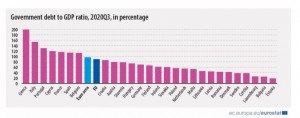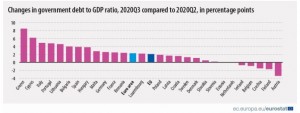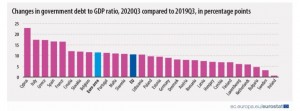January 27, 2021
As at the end of the second quarter of 2020, the government debt to GDP ratio for the euro area was 97.3% relative to 95.0% at the end of the second quarter of 2020. Notably, Q3 2020 is still impacted by policy responses to the COVID-19 containment measures, which materialised in increased financing needs. According to a report published by Eurostat, the statistical office of the European Union, the rise Government debt to GDP is due to two factors, increase in government debt and decrease in GDP. Notably, “In the EU, the ratio increased from 87.7% to 89.8%. Compared with the third quarter of 2019, the government debt to GDP ratio rose in both the euro area (from 85.8% to 97.3%) and the EU (from 79.2% to 89.8%),” as per Eurostat.
In addition, debt securities accounted for 82.3% of euro area and for 82.1% of EU general government debt at the end of the third quarter of 2020. Whereas loans constituted 14.5% and 14.8% in the euro and EU, respectively. Currency and deposits consisted of 3.3% of the euro area and 3.1% of the EU government debt. It was noted, “Due to the involvement of EU Member States’ governments in financial assistance to certain Member States, quarterly data on intergovernmental lending (IGL) are also published. The share of IGL as percentage of GDP at the end of the third quarter of 2020 amounted to 2.0% in the euro area and to 1.7% in the EU.”
Government debt at the end of the third quarter 2020 by Member State
Notably, at the end of the third quarter of 2020, the highest ratios of government debt to GDP were observed in Greece (199.9%), Italy (154.2%), Portugal (130.8%), Cyprus (119.5%), France (116.5%), Spain (114.1%) and Belgium (113.2%), and the lowest in Estonia (18.5%), Bulgaria (25.3%) and Luxembourg (26.1%).

In comparison to the second quarter of 2020, twenty Member States experienced a rise in their debt to GDP ratio at the end of the third quarter of 2020, five registered a decrease and the ratio remain stable in Estonia and the Netherlands. The largest increases in the ratio were observed in Greece (+8.5 percentage points – pp), Cyprus (+6.2 pp), Italy (+4.9 pp), Portugal (+4.8 pp), Lithuania (+4.6 pp) and Bulgaria (+4.0 pp). The decreases were recorded in Austria (-3.4 pp), Finland (-1.7 pp), Czechia (-1.5 pp), Belgium (-0.9 pp) and Ireland (-0.7 pp).

In comparison to the third quarter of 2019, all Member States reported growth in their debt to GDP ratio at the end of the Third quarter of 2020. The largest increases in the ratio were recorded in Cyprus (+22.9 pp), Italy (+17.4 pp), Greece (+17.3 pp), Spain (+16.6 pp) and France (+16.5 pp).).

Disclaimer:
Analyst Certification -The views expressed in this research report accurately reflect the personal views of Mayberry Investments Limited Research Department about those issuer (s) or securities as at the date of this report. Each research analyst (s) also certify that no part of their compensation was, is, or will be, directly or indirectly, related to the specific recommendation(s) or view (s) expressed by that research analyst in this research report.
Company Disclosure -The information contained herein has been obtained from sources believed to be reliable, however its accuracy and completeness cannot be guaranteed. You are hereby notified that any disclosure, copying, distribution or taking any action in reliance on the contents of this information is strictly prohibited and may be unlawful. Mayberry may effect transactions or have positions in securities mentioned herein. In addition, employees of Mayberry may have positions and effect transactions in the securities mentioned herein.
